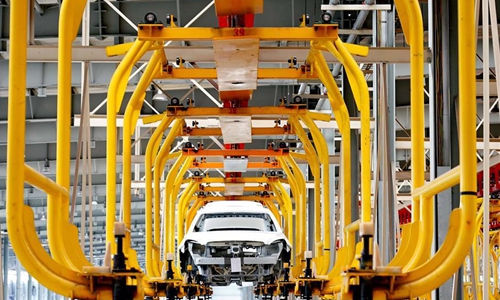Daimler, Volkswagen invest in Chinese EV battery makers
Source:Global Times Published: 2020/7/5 16:13:40
Investment in Chinese battery-making firms a short-cut for carmakers to dominate in the future EV era

A production line is seen at a subsidiary of Beijing Electric Vehicle Co., Ltd., a new energy vehicle producer, in Cangzhou, Hebei province, on July 6, 2019. (Photo/Xinhua)
Leading Global automakers are ramping up efforts to secure partnerships with Chinese EV battery firms to gain a share of the giant Chinese market and strengthen competitiveness worldwide, a move industry analysts say shows optimism in the world's largest EV market despite a slowing global economy.
On Friday, German carmaker Mercedes-Benz announced a strategic partnership with the Chinese battery cell manufacturer Farasis Energy Co based in East China's Jiangxi Province, including taking an equity stake. With the new partnership, Mercedes-Benz will take a stake of around three percent in the Chinese cell manufacturer.
"China is the world's largest electric car market with tremendous potential for further development. We are already working with strong and trusted partners in China, not only to enhance our local footprint but also to strengthen our competitiveness worldwide," said Hubertus Troska, member of the Board of Management of Daimler AG, responsible for Greater China.
The move, which is also the first time Daimler will take a stake in a Chinese battery cell manufacturer, will "enable us to pursue our electric strategy globally. In the future, we will continue to strengthen our activities in research and development, production and purchasing in China," Troska said.
The investment in the Chinese cell firm is also in line with the German carmaker's plan to accelerate implementation of its electrification strategy and China is a key market for this.
Since 2015, China has been Daimler's largest overseas single passenger vehicle market. In May 2020, Mercedes-Benz sold nearly 135,000 passenger cars worldwide, with more than 70,000 vehicles sold in China, accounting for more than 50 percent of total sales.
Key elements of the agreement also include the development and industrialization of highly advanced cell technologies, accompanied by goals for cost competitiveness. The technological focus is on significant increases in range, through advances in energy density and the reduction of charging times, Daimler said in a company statement.
The contract will provide a secure source for the supply of battery cells for Mercedes-Benz's electrification strategy, while Farasis gains security for its planned construction to increase production capacity. In order to meet the increasing demand for German Mercedes-Benz plants in the future, Farasis is building a plant for battery cells in Bitterfeld-Wolfen, creating up to 2,000 new jobs, according to the statement.
As electrification is an inevitable global trend for global automakers, China, with its complete and mature EV battery-making industry chain and vast application market, would no doubt be an ideal choice for industry giants who want rapid transformation and reduced costs, Liu Yong, secretary general at the Energy Storage Application Branch under China Industrial Association of Power Sources, told Global Times on Sunday.
"China's strength in battery-making lies in its technology, lower costs and recycling under the central government's support and encouragement over the past few years," Liu said.
"With German carmakers' expertise in traditional car manufacturing and China's technological strength in the EV battery industry, cooperation is set to be a win-win solution," Liu said.
A global race
Daimler is not the first in the industry with eyes on Chinese EV battery firms.
Previously, German automaker Volkswagen became the biggest shareholder of China's EV battery maker Guoxuan High-Tech Co with a 26.47 percent stake and investment worth 1.1 billion euros ($1.2 billion), a move marking Volkswagen as the first foreign auto firm to directly invest in a Chinese battery venture.
Yu Qingjiao, secretary general of the Zhongguancun New Battery Technology Innovation Alliance, told Global Times that Asian firms have an advantage in EV battery-making compared with their European counterparts.
According to South Korea's market tracker SNE Research, Ningde-based Contemporary Amperex Technology Ltd (CATL) ranked No.1 globally in 2019 with a 27.9 percent market share and usage of its EV batteries rising 39 percent year-on-year to 32.5 Gigawatt hours (GWh). CATL was followed by Japan's Panasonic Corp with a 24.1 percent market share and South Korea's LG Chem with a 10.5 percent market share.
CATL has signed supply deals with Tesla and Volkswagen, and expects to increase its battery manufacturing capacity in the next two years, Chairman Zeng Yuqun said in a recent interview with Reuters. Tesla has reportedly chosen the leading Chinese battery maker as a partner to co-develop its next-generation battery, which will have lower costs and a longer life.
As the industry is becoming more competitive, more global carmakers are set to join the race in the future, as investment in the Chinese EV battery-making sector will be a short-cut for them to dominate in the future EV era, industry analysts said.
Posted in: INDUSTRIES,BIZ FOCUS